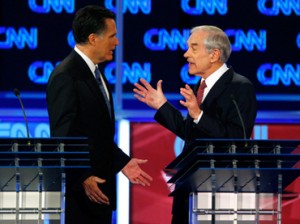Mitt Romney Has No Practical Reason to Select Ron Paul as His Running Mate

Over at Reason, A. Barton Hinkle thinks there is a case for Mitt Romney to select Ron Paul as his running mate:
'And that's one thing Paul would bring to the Romney ticket which it lacks now: intensity. . . .Picking Paul as his running mate would enable Romney to draft the Texas congressman's revolutionary army--or at least a good portion of it.It also would give the ticket something else it has lacked up to this point: spine. Romney is notorious for changing his positions on the issues. Paul is widely admired for sticking to his (mostly) libertarian principles. . . .Going up against Obama/Biden, Paul would be the only candidate of the four to have opposed the Patriot Act. Nor will many right-wingers approve of Paul's position on the war on drugs ("a detriment to personal liberty"; "why is it we can't put into our body whatever we want?") prostitution (legalize it) or gay marriage (ditto). But they will like his tough stance on immigration, his longstanding opposition to abortion, and his reputation as "Dr. No" for voting against legislation not expressly authorized in the Constitution.'
This proposition is preposterous even for Romney.
Hinkle misses the point that a vice president is supposed to enhance the ticket, not cause a distraction. If Paul Ryan, Chris Christie, or Scott Walker were on the GOP ticket they would each produce a three-ring circus. The presence of any of those lightning rods would make the election a referendum on Ryan's budget, or Christie's or Walker's union battles rather than the Obama economy.
While his presence on the ticket and independence of thought would be a blast of fresh air in a campaign between establishment stormtroopers it's that very reason that will preclude Paul from even the longest of VP long lists. Despite their political baggage Ryan, Christie, and Walker would faithfully ape the party line while adhering to the role of attack dog.
Although Paul holds many positions Republicans can tolerate, the intellectual diversity Hinkle thinks is an asset would be a liability to Romney. Anyone who knows anything about Paul, which may not include Reason columnists, knows that Paul is just as likely to attack the failings of his own party leader as he is the Democrats.
When the Republican Party is focused solely on defeating the Democratic incumbent they are going to be intent on maintaining message discipline. Not only is Paul poor at disciplining his own message but there will be a media firestorm when the VP of one major party attacks the top of his own ticket as no better than the Democratic president.
Above all, there is no practical reason for Ron Paul to join the ticket. In fact, it is hard to consider a move more baffling to his political legacy than joining a Romney ticket.
In the absence of a Republican president the last three years there has been an intellectual vacuum in the GOP. Paul has helped fill it with education about the Federal Reserve and there was even token opposition to President Obama's extra-constitutional war in Libya. It has been a Democratic administration, not a Republican one, in which Paul's program has received a fairer hearing.
The paradox for many conventional, partisan voters is that Paul's agenda of free markets, peace, and sound money actually has a better chance to be heard during a Democratic administration because it's easier for rank-and-file Republicans to see the pitfalls of evaporating civil liberties, open-ended warfare, and fiscally reckless socialism when done by the other party. While it is not going to last forever, the longer the Republicans are out of the White House the better the chance a Paul-like alternative can arise within the GOP.
As Hinkle notes later on in his article, Paul's supporters have achieved gains not confined to winning delegates in primaries but by taking advantage of party rules in state Republican conventions and accumulating more delegates that way and even gaining a majority in Nevada's Republican Party.
Of course, the reward for Paul supporters' clever outmaneuvering was the Old Guard taking their ball and creating their own "shadow party."
Hinkle is right to ask why Paul might want to say yes to this hypothetical proposition. But if Nevada is any indication, there may not be enough room for Paul and Romney in the entire party, much less the same ticket.




